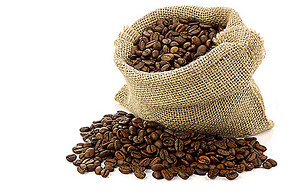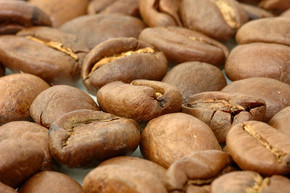Kenyan Coffee Manor skin, brief introduction of Kenyan Coffee
Follow the caf é (Wechat official account vdailycom) and found that Beautiful Cafe opened a small shop of its own.
Kenya is a neighboring country of Ethiopia, the country of origin of Arabica coffee. The time when Kenya began to grow coffee is said to be at the end of the 19th century. The seeds were brought into Kenya by Christian missionaries and planted in farms run by the colonial power, but Kenya was not allowed to grow coffee until after World War II. 60 per cent of Kenya's coffee production comes from about 700000 small-scale farmers, while the rest is supplied by about 4000 farms. It is the largest coffee producer, including around Mount Kenya between the northeast and northwest of Nairobi, and around the Aberdare Mountains. Others such as Ruiru, Thika, Embu, Meru and Nyeri are also well-known producing areas. Coffee is also grown in the western part of the country near Uganda (Uganda), Kitale and Butare of the Tanzanian border. Organize the report on the coffee.

From the 1970s to the mid-1980s, Kenyan coffee export sales have been maintained at more than 40% of the country's total export, which has played an important role in supporting Kenya's overall economy, but it has now dropped to less than 4%. Despite the significant decline in external sales, Kenya remains committed to variety improvement, improved processing and open distribution channels, so that Kenyan coffee can be highly valued all over the world. Throughout the global boutique coffee market, Kenya remains a major producer.
In Kenya, there are nine estates run by SOCFINAF, a local consortium funded by Belgian multinational enterprises, including Tatu, Mchanna, GethumbWin, Eaagdads, Mtaro, Wango, Ruera, Oaklands and Karengaita. These estates are highly valued in the global boutique coffee market and are concerned by top traders. AA-grade coffee beans are often "raided" at high prices in every auction.
Aroma Flavor
Strong caffeic acid and aroma like citrus or red wine
SL28 is a representative variety with unique aroma of Kenyan coffee. The multi-layered caffeic acid and thick thickness of Kenyan coffee have a deep sense of balance. Through the vigorous cultivation of SL28 varieties, it emphasizes the acidity of citrus or red wine, which adds characteristics to the producing area itself. Generally speaking, there are many different grades, such as high acidity, thick feeling and so on.
Variety Kind
Sun-resistant SL28 and Highland SL34
Make every effort to cultivate SL28 and SL34 with outstanding aroma. SL is the abbreviation of "Scott Laboratoris", a coffee research institute based in Nairobi. Both of these are the dominant gene varieties in a million.
Harvest Crop
There is a specific name for the harvest twice a year.
Kenya has two rainy seasons a year, so there are also two harvest periods. The first harvest period is from November to the beginning of the following year, called "Main Crop", and the harvest in June and July is called "Fly".
Grade Class
In addition to size and appearance, it is also graded by quality.
Beans with sieve size more than 17 are classified as AA, while beans with size 15-16 are classified as AB. In addition, including the appearance of raw coffee beans and fried beans, the quality of coffee extract, will also be strictly tested and graded.
Refined Refinement
Manual sorting according to maturity
Almost all the local coffee is refined by washing. The harvested coffee bean cups are sent to the refining plant, wait until the drying and moisture adjustment process is completed, and then sent to the next factory for sorting.
Auction Auction
Auctions that have continued since 1930
Nairobi, the capital of Kenya, holds coffee auctions every Tuesday, usually only for authorized exporters. Later, due to deregulation, the sale of coffee does not have to be auctioned, but most of the coffee is still circulated through auctions in order to ensure that the quality continues to improve.
Important Notice :
前街咖啡 FrontStreet Coffee has moved to new addredd:
FrontStreet Coffee Address: 315,Donghua East Road,GuangZhou
Tel:020 38364473
- Prev

Introduction to the altitude planting area of coffee in Kenya
Follow Cafe (Wechat official account vdailycom) found that Beautiful Cafe opened a small shop of its own, a rare good coffee-famous for its strong aroma and balanced acidity. People in the coffee industry all think that Kenyan coffee is one of its favorite products, because Kenyan coffee contains every feeling we want from a good cup of coffee. It's wonderful.
- Next

The characteristic of Rwandan coffee, Rwandan Malaba coffee
Following Cafe (official Wechat account vdailycom) found that Rwanda Coffee has opened a small shop of its own: the taste of Rwanda Coffee is described as grassy aroma with tropical climate characteristics. In addition to the sweetness of fruit, this coffee can also give people a feeling of freshness, clarity, and freshness. Bourbon coffee grown in Rwanda
Related
- Detailed explanation of Jadeite planting Land in Panamanian Jadeite Manor introduction to the grading system of Jadeite competitive bidding, Red bid, Green bid and Rose Summer
- Story of Coffee planting in Brenka region of Costa Rica Stonehenge Manor anaerobic heavy honey treatment of flavor mouth
- What's on the barrel of Blue Mountain Coffee beans?
- Can American coffee also pull flowers? How to use hot American style to pull out a good-looking pattern?
- Can you make a cold extract with coffee beans? What is the right proportion for cold-extracted coffee formula?
- Indonesian PWN Gold Mandrine Coffee Origin Features Flavor How to Chong? Mandolin coffee is American.
- A brief introduction to the flavor characteristics of Brazilian yellow bourbon coffee beans
- What is the effect of different water quality on the flavor of cold-extracted coffee? What kind of water is best for brewing coffee?
- Why do you think of Rose Summer whenever you mention Panamanian coffee?
- Introduction to the characteristics of authentic blue mountain coffee bean producing areas? What is the CIB Coffee Authority in Jamaica?

